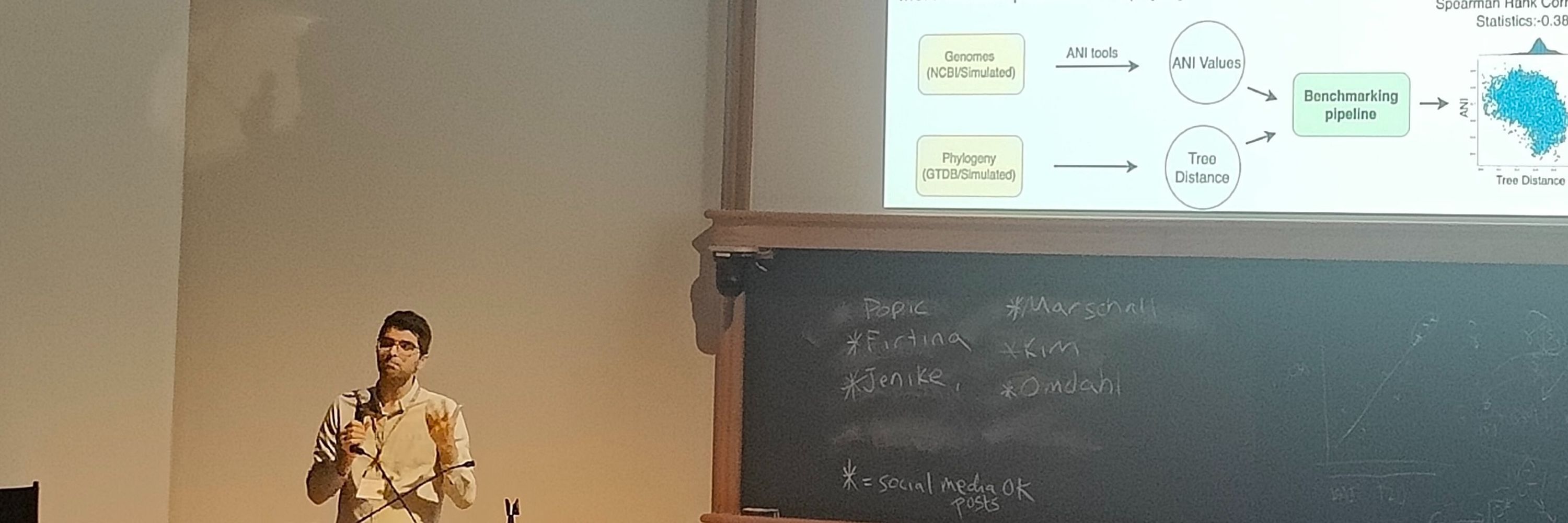
@johannavw.bsky.social presented Gemsparcl—Rapid and consistent genome clustering for navigating bacterial diversity with millions of genomes" #GI2025

@johannavw.bsky.social presented Gemsparcl—Rapid and consistent genome clustering for navigating bacterial diversity with millions of genomes" #GI2025
with myloasm"
This efficient tool uses SNPmers and leverages high quality ONT and PacBio reads for metagenome assembly.
myloasm: doi.org/10.1101/2025.09.05.674543


with myloasm"
This efficient tool uses SNPmers and leverages high quality ONT and PacBio reads for metagenome assembly.
myloasm: doi.org/10.1101/2025.09.05.674543
design choices" #GI2025 He focused more on task-specific models & showed multi-task models lack causal interpretability.
ChromBPNet: doi.org/10.1101/2024.12.25.630221
encodeproject.org


design choices" #GI2025 He focused more on task-specific models & showed multi-task models lack causal interpretability.
ChromBPNet: doi.org/10.1101/2024.12.25.630221
encodeproject.org


approaches"
Mammalian Immune Luci: doi.org/10.1093/molbev/msaf152
PatchWorkPlot: doi.org/10.1093/bioinformatics/btaf504

approaches"
Mammalian Immune Luci: doi.org/10.1093/molbev/msaf152
PatchWorkPlot: doi.org/10.1093/bioinformatics/btaf504
A very cool application of gene orthology across species for single-cell expression analysis! #orthology #GI2025 #singlecell



A very cool application of gene orthology across species for single-cell expression analysis! #orthology #GI2025 #singlecell
Chromap-QC: biorxiv.org/content/10.1101/2025.07.15.664951
Chromap: nature.com/articles/s41467-021-26865-w #GI2025


Chromap-QC: biorxiv.org/content/10.1101/2025.07.15.664951
Chromap: nature.com/articles/s41467-021-26865-w #GI2025
Cong Ma gave a great talk on "COMPOSITION—Efficient modeling of cell type and spatial organization for high resolution spatial transcriptomics"
Cong Ma gave a great talk on "COMPOSITION—Efficient modeling of cell type and spatial organization for high resolution spatial transcriptomics"
It uses sequence embeddings from HyenaDNA in addition to feed-forward NN form alignment pileup for splice detection, which is very cool!
It uses sequence embeddings from HyenaDNA in addition to feed-forward NN form alignment pileup for splice detection, which is very cool!
NTv2 nature.com/articles/s41592-024-02523-z
They post-train the model (pre-trained on open genome dataset) with different genomic annotations and tracks. Preprint will be out soon!
NTv2 nature.com/articles/s41592-024-02523-z
They post-train the model (pre-trained on open genome dataset) with different genomic annotations and tracks. Preprint will be out soon!
doi.org/10.1101/2025.05.30.656746

doi.org/10.1101/2025.05.30.656746



They showed that matryoshka SAEs arxiv.org/abs/2503.17547 improves upon openSpliceAI elifesciences.org/reviewed-preprints/107454. #GI2025

They showed that matryoshka SAEs arxiv.org/abs/2503.17547 improves upon openSpliceAI elifesciences.org/reviewed-preprints/107454. #GI2025

